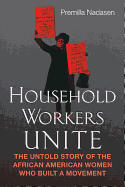
Premilla Nadasen (Welfare in the United States) is an associate professor of history at Barnard and a labor and poverty activist. She believes that storytelling is a vital form of activism and though her prose is sometimes dry, the vivid stories and voices of domestic workers and activists dominate her fourth book, Household Workers Unite.
In 1950, 60% of U.S. domestic workers were African American women. White people romanticized the "mammy" image of such workers, the "content and loyal household worker" who was "one of the family"--a member who used separate doors and toilets, ate leftovers in the kitchen and worked long, unpredictable hours for starvation wages. "Considered difficult to organize, and neglected by most labor organizers, they had no choice but to strike out on their own." Later, as the feminist movement gained strength, the experiences and achievements of household workers were often disregarded by those who imagined that paying for housework would raise its status, and by "nice ladies who have bought their freedom from household work at the expense of those who have no choice."
Nadasen overturns the popular image of African American domestic workers in the mid-20th century as passive caretakers and victims. Instead, she shows that they redefined domestic work as a profession deserving decent pay, proper training and respect, and built influential local and national labor organizations. Household Workers Unite adds a significant contribution to the history and ongoing discussions of labor organization, feminism and civil rights. --Sara Catterall

